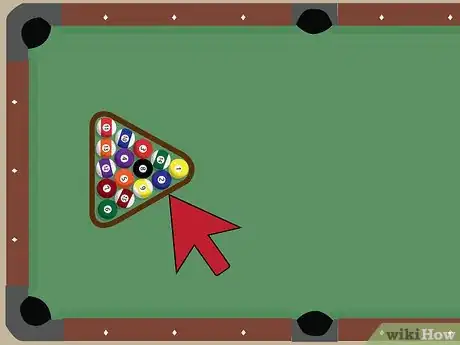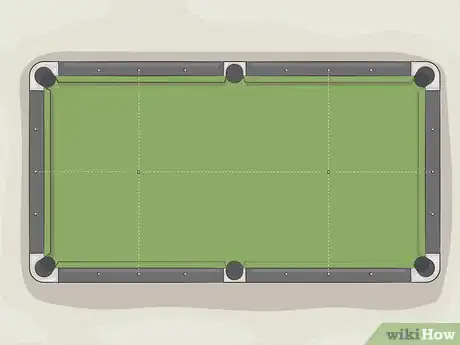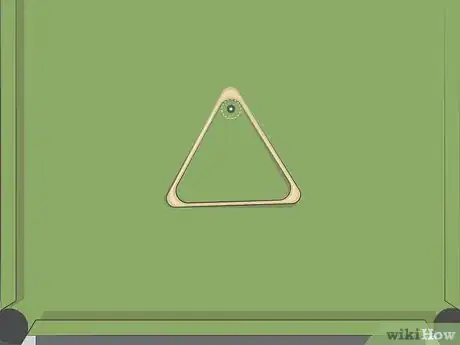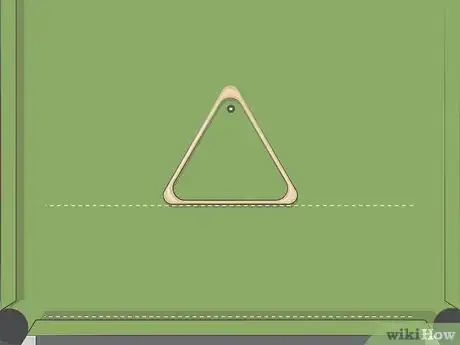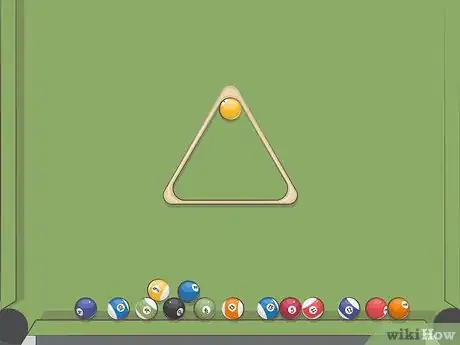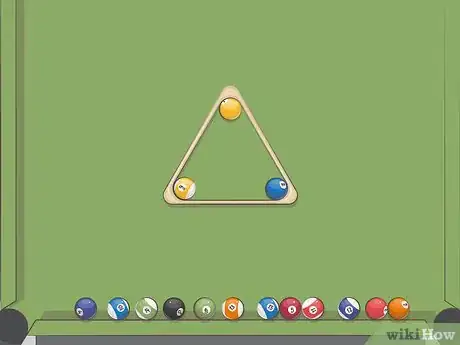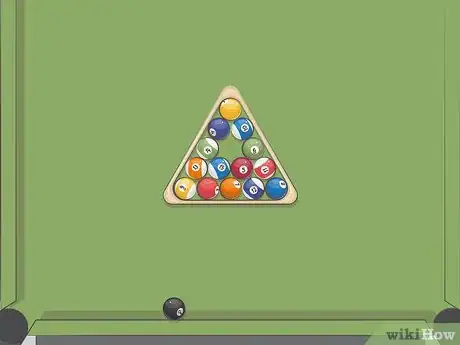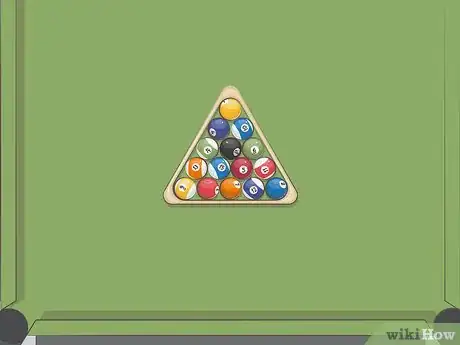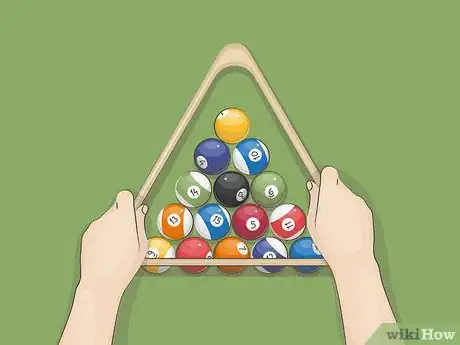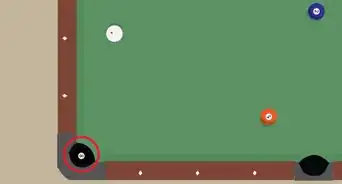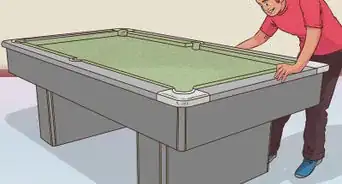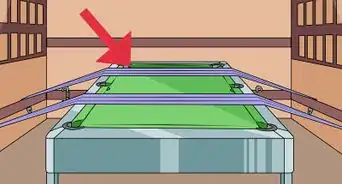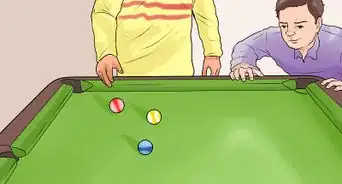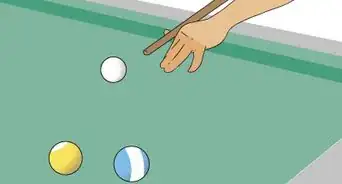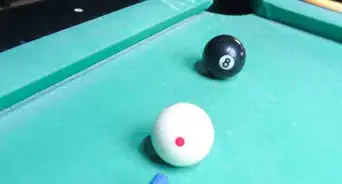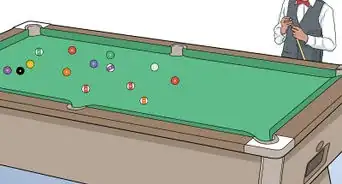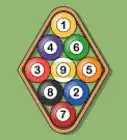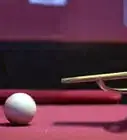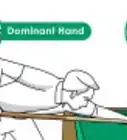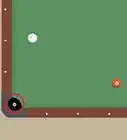This article was co-authored by wikiHow Staff. Our trained team of editors and researchers validate articles for accuracy and comprehensiveness. wikiHow's Content Management Team carefully monitors the work from our editorial staff to ensure that each article is backed by trusted research and meets our high quality standards.
wikiHow marks an article as reader-approved once it receives enough positive feedback. In this case, 92% of readers who voted found the article helpful, earning it our reader-approved status.
This article has been viewed 512,634 times.
Learn more...
There are a number of variations to the game of 8-ball pool, but all of them begin the same way. First, you rack the 15 numbered balls inside a triangular rack, and then one of the players shoots to “break” them. Getting the balls in the right order might seem confusing, but it’s actually fairly simple when you know the rules.
Steps
Positioning the Rack
-
1Let the player who will break first rack the balls. In a recreational game, toss a coin or do a “lag” test to determine who will break and rack. To do the lag, position 1 ball on either side of the table, and have each person shoot to the other end cushion. The person whose ball hits the cushion and bounces back closest to the spot where they shot their ball will pick who breaks.
- In a professional game, the player with the lowest official standing in the league always breaks first.
- If possible, you can have a player who isn’t playing rack the balls and act as a referee for the game.
-
2Locate the black and white dot at the end of the pool table. Most pocket billiard tables are marked with a “foot spot” in the center of one end of the table, about halfway between the corner and side pockets. The foot spot is the spot furthest from the end of the table where the players stand during the break shot.[1]
- If the table doesn’t have a marked foot spot, use the markings around the edge of the table to determine where it would be. The spot should rest on the centerline of the table when you’re standing at a short end. The spot will align with the 2nd mark on the edge of the table between the corner and side pockets.
Advertisement -
3Place the triangle rack with the top point over the foot spot. The rack is an equilateral triangle, so it doesn’t matter which point you put over top of the foot spot. Make sure you can see the black and white dot touching the top of the interior of the triangle. This spot is called the “apex” of the rack.[2]
- Ensure the center of the ball that is placed in the apex of the rack will be exactly in the middle of the dot.
- There are other rack shapes, like the diamond, but those aren’t used for 8 ball pool.
-
4Position the rack so that the base is parallel to the short end of the table. Once you have the apex positioned on top of the foot spot, make sure the bottom of the triangle is straight. The corners of the rack should be equal distances from the corner pockets on their side of the table.
- If the base is crooked, this can cause one of the sides of the rack to have a greater chance of going into a pocket.
Organizing the Balls
-
1Place any ball other than the 8-ball inside the triangle at its apex. Pick any one of the 7 striped or 7 solid balls, and position it on top of the foot spot inside of the rack. Many players like to use the 1-ball at the top of the rack, but there are no official rules regarding which ball should go at the apex.
- This is different from 9 and 10 ball pool, which both require the 1-ball to be at the apex of the rack.
-
2Place a solid ball in one corner and a striped ball in the other corner. Pick any one of the remaining striped and solid balls to put them in the corners to provide an equal chance of one of them going in a pocket. It doesn’t matter which number the ball has on it, as long as it isn’t the 8-ball.
- If one of the balls goes into a pocket on the break, the player can choose to keep shooting for that type of ball, or they can choose the other type. For instance, if the solid 6-ball went in the pocket, the player would be able to keep shooting solids or they can choose to shoot stripes instead.
- If both the striped and the solid balls go in a pocket on the break, the player who shot first gets to choose which type of ball they’d like to continue playing for.
-
3Fill in the space between the corners with the rest of the balls. Place the balls in any order of solids and stripes, filling in any of the open spaces and making sure not to move any of the previously placed balls. Most players position a solid and a stripe in the lower 2 spots of the inner triangle.[3]
- Some players choose to alternate between solids and stripes as much as possible to make sure both solids and stripes have an equal chance of going in the pocket on a break.
-
4Place the 8-ball in the center of the third row of the rack. This is done to reduce the likelihood of the 8-ball being pocketed on the break. Skip a row under the apex ball, and place the 8-ball so that it’s vertically aligned with the apex ball.[4]
- If the 8-ball is pocketed on the break, the player who didn’t break would receive an automatic win for the game. Placing it in the center of the rack reduces the likelihood of this happening.
-
5Roll the rack up and down to ensure that it is packed tightly. Push your fingers into the rack under the bottom row of balls, and then slightly push the rack forward. Pull the rack back again so that the apex ball is aligned with the foot spot and the base is parallel to the back of the table.
- If the table has flaws that prevent you from placing the apex ball directly over the foot spot, the UPA’s rules allow you to place it within a dime’s radius (half the width of a dime) of the foot spot.
-
6Lift the rack up off of the table without moving the balls. Take your fingers out of the rack and place them on either side of the rack. Lift the rack directly up off the table to avoid touching or shifting the balls.
- If you’re having trouble, try lifting the back end of the rack and pushing the apex forward and away from the balls before you lift it up. This will give you more space to move as you lift the rack.
Community Q&A
-
QuestionIf I shoot at a numbered ball and scratch, where does the cue ball go for the next shot?
 Community AnswerSome people do ball in hand, which is where you can basically place it anywhere. Others make you place it anywhere behind the break line.
Community AnswerSome people do ball in hand, which is where you can basically place it anywhere. Others make you place it anywhere behind the break line. -
QuestionWhere do I rack if there is no foot spot on the table?
 Glen A. JacksonCommunity AnswerIn that case, hopefully there are diamond markers on the head, foot, and side rails; most but not all tables have them. Try to line yourself up, with the center of the rack right at the center foot rail diamond. Put all the balls in the rack, and then move it forward so the top ball is at the intersection of the center foot rail diamond and the 2nd diamond on the closest side rails. Without the diamonds, the concept is still the same, it just requires more guesswork. Lots of people will mark this with a simple black spot using a permanent marker. On old, felt-worn tables, the felt may be bare in that spot, possibly even have a small dimple where the top ball would be.
Glen A. JacksonCommunity AnswerIn that case, hopefully there are diamond markers on the head, foot, and side rails; most but not all tables have them. Try to line yourself up, with the center of the rack right at the center foot rail diamond. Put all the balls in the rack, and then move it forward so the top ball is at the intersection of the center foot rail diamond and the 2nd diamond on the closest side rails. Without the diamonds, the concept is still the same, it just requires more guesswork. Lots of people will mark this with a simple black spot using a permanent marker. On old, felt-worn tables, the felt may be bare in that spot, possibly even have a small dimple where the top ball would be. -
QuestionMost of the time my hand trembles when I take a shot, which sometimes makes me miss the cue ball. How can I improve on this?
 Community AnswerPress the heel of your hand tighter to the table. Use an open bridge instead of a closed bridge. If shooting from the rail, place the palm of your hand against the outside of the rail.
Community AnswerPress the heel of your hand tighter to the table. Use an open bridge instead of a closed bridge. If shooting from the rail, place the palm of your hand against the outside of the rail.
Things You’ll Need
- Regulation pool table
- 15 numbered balls
- Triangular rack
References
About This Article
To rack in 8-ball, locate the foot spot on the pool table and place the triangle rack over it. Next, place any ball other than the 8-ball inside the triangle at its apex, then place a solid ball at one of the far corners and a striped ball at the other far corner. Fill in the space between the rack corners with the other solid and striped balls in any order you like. Then, place the 8-ball at the apex of the inner triangle of balls. For more tips on positioning the rack, read on!
